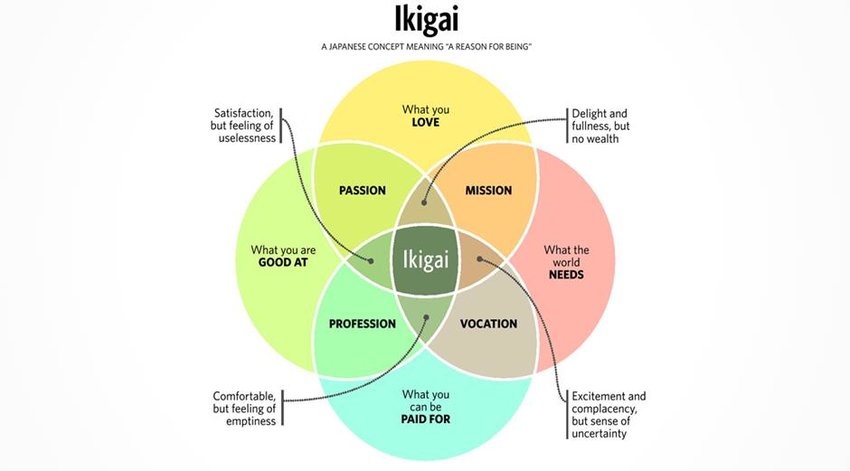What will make you happier: retiring early or never retiring at all?
What's the difference between people who retire early and who never retire? The answer is actually pretty complicated.

The answer likely is something that looks and feels a bit like both.
“If I just grit my teeth and put in my time at work, one day when I’m 60 or 70, I can leave my job and spend my time doing what I really want to do.”
Does this sound familiar? It’s likely this is what your parents or grandparents preached to you at your high school and college graduations or the day you started your first real job.
This retirement mindset can lead to unnecessary misery at best or, at worst, be the cause of significant, potentially debilitating stress. Which is why a growing number of us are rejecting it.
But what does that leave us with?
In a perfect world, we wouldn’t have to contemplate things like “retirement,” regardless of when to retire. In a perfect world, each of us would connect with our core purpose and the money part simply would work itself out.
In reality, though, figuring it out requires some exploring and perhaps serious soul searching. Everything from finding out how people who never retire stay energized and what makes you happy regardless of your retirement.
Working with a purpose leads some to want to work forever
For anyone seeking a vision for their work life, hearing the stories of people who happily worked into their 80s and 90s can be instructive. Betty White, for instance, is probably one of the first to come to mind when we think about people who seem delighted to keep working. At 97, White is America’s longest standing sweetheart and also falls into the “never-retiring” self-identifying category.
Then there’s Marty Allen, half of the comedic duo “Allen and Rossi” that hit stardom in the 1960s. Allen, according to a 2014 USA Today article, was performing stand-up comedy in Vegas at the age of 92.
"I don't see [myself] retiring," he told USA Today. "What do you do? Why would you retire as long as you can walk or talk? I just don't see retiring. I think it slows you down in life. I actually love people, and in my heart, I love entertaining," he said.
But you don’t need to be a performer to work with purpose
Arthur E. Imperatore Sr. got his start way before people set out to quit working in their 40s and 30s. In the 1980s, at 55 years-old, he founded a company, New York Waterway to provide ferry service between New Jersey and Manhattan.
Eighty-eight at the time, he said he had refused to retire. "’I tried some versions of partial retirement and I decided I'd better go to work and make a living and keep my nose to the grindstone. It keeps me younger and keeps my brain from atrophy. I really believe that retirement is debilitating, if not physically, certainly emotionally. I've had plenty of problems trying to get here in the morning. I feel old and decrepit. [Yet,] I hit the doorway to the terminal, and I get fired up,’” he said.
As of August 2018, according to an article by The Jersey Journal, Imperatore was still overseeing day-to-day operations at his company. The story noted how, as a 10-year-old, Imperatore declared a goal to become a millionaire. It’s probably safe to say Imperatore surpassed that goal quite a few decades ago.
Not too long ago, through the course of my writing, I met a woman who feels the same about work as Allen. Her name is Sharon Meeks DeBouse and about ten years ago, after decades of being in the corporate world, she quit to do her own thing and hasn’t looked back.
While you can classify that life change under “early retirement,” if you’d like to, Sharon says it was all part of following her purpose, which is supporting people in their professional growth. She loves the freedom she has now with her work. She started consulting in a variety of capacities, including executive coaching, business strategy and career counseling. She is also a freelance customer service agent supporting many global brands.
On top of all of that, being in a home office and forgoing the logistical challenges associated with being in a company office has energized Debouse. “At home, you curate your workspace and surround yourself with things that bring you joy. You’re not struggling to get out the door and to an office on time or in a rush to get out at night. It’s much more even-keeled,” she said.
She’s loving it so much that she doesn’t see herself retiring. “Why would I want to stop what I’m doing? I love it!”
DeBouse and others working into advanced ages are part of a growing trend of people working longer. In 2019, the participation rate of retirement-age workers cracked the 20 percent mark, according Bloomberg.
The link between purpose and happiness may not be rocket science but it is backed by research
Best-selling author, Neil Pasricha, questions our mentality for retirement and work. “The reality is terrible. Where did this concept even come from? Stopping work completely—where do we even get this idea?,” Pasircha said in a radio interview. He asked the question as part of his research for his book The Happiness Equation.
After all, “retirement” is a concept invented not that long ago. Pasircha said he learned it originated in Germany in 1889, a time of high youth unemployment. Pasircha said the country’s chancellor declared “‘those who are infirm, who want to leave the workforce at age 65, the government will pay you a little bit of money to do so.' Interesting things to note: no other state, no other country around the world was yet doing this.”
Since then, “we've vastly increased the number that we live to. So we've created this huge gigantic gap where our savings are supposed to pay for 30 years of our best lifestyle,” Pasircha said.
Being conscious daily of your purpose may make you happier regardless of which camp you’re in—early retirement or no retirement.
Pasircha notes a lesson he learned by studying people in Okinawa, Japan. Okinawans have no word for retirement. Instead, they have something called 'ikigai,' that gives them meaning throughout their lives. The word “translates as the reason you get out of bed in the morning,” Pasircha said.
“I call it structure but basically, you'll have a 100-year-old fisherman who's like, 'my ikigai is to provide fish for my family.' You have a 110-year-old woman who says, 'my ikigai is to take care of my great great great grandchildren.' And when you have this sense of structure in your life ... it helps you get out of bed. It helps you do something.”

Okinawans are known as some of the longest-lived people. And there’s science that may indicate a relationship to ikagi.
A 2010 study published in Applied Psychology, individuals with high levels of eudemonic well-being—which involves having a sense of purpose along with a sense of control and feeling like what you do is worthwhile—tend to live longer. Researchers found that the people with the strongest well-being were 30 percent less likely to die during the eight-and-a-half-year follow-up period.
This tells us that having a purpose is particularly important in figuring out how to achieve work/life balance. Steve Adcock, ThinkSaveRetire founder, early retirement guru and full-time traveler, emphasizes the importance of “purpose” regardless of whether you’re after early retirement or never retirement.
“There’s no way in hell the absence of a full-time job will ever truly cure you of your lack of purpose. It won’t happen. If you quit your job without something else in your life to keep you busy with a genuine sense of accomplishment, you WILL go back to work or you’ll feel dreadfully hollow in early retirement,” Adcock said in a 2018 post.
Adcock said before quitting his corporate job at the age of 35, he made sure to understand his sense of purpose outside of his job.
“I gained very little satisfaction out of my job, so I found it relatively easy to discover more creative pursuits that very quickly became my purpose and passion in life sans full-time job,” he said.
Not sure what your life’s purpose is? Start with these three tips:

Honestly, we could learn a lot from the Okinowans and their ikagi. Doing so requires asking “deep” questions, possibly in the way Conscious Lifestyle Magazine suggests:
“‘What “should” I be doing with my life?’ is a worry of the Protector rather than a creative inquiry from the Connector. This way lies suffering. Instead, sense what fits the effervescent changes that are going on within you and outside of you. Over time, your life purpose will emerge. It is a conversation. If the old stories about what is ‘right’ and ‘wrong’ get in the way, you won’t be able to stay in tune with the chat. We have to stay in a biodynamic, responsive relationship with what is, not what our Tiny Me thinks ‘should’ be.”
With a little searching of the interwebs, you’ll source all kinds of helpful guides and lists of questions aimed at excavating “purpose.” Just to help clear the way so you can get started, check out the purpose-finding suggestions that follow.
1. Identifying intrinsic value reveals purpose
Be mindful of the intrinsic value of your work. Although it sounds rather elementary, all too often we forget that, taken at the 50,000-foot view, our work usually contributes more than it feels like in the daily grind.
The intrinsic value is clear for lots of occupations -- think doctors, teachers, police officers, firefighters and airline pilots. Many of us, however, do work where the important purpose is more obscure. That just means we have to get thoughtful to recognize it. But connect all the dots between your function, what your organization does and how its goods and services meet the needs of its audiences, and intrinsic value usually is clear.
Knowing what it is and making it a touchstone should warm your heart. If you don’t get a warm and fuzzy feeling, how do you feel? Maybe you still feel high satisfaction, perhaps for another reason. If in the absence of satisfaction, you feel as if something is missing, it may be a sign you need to find work with a higher intrinsic value.
Yale Professor Yale Professor Amy Wrzesniewski interviewed hospital custodial staff to glean insight on what allowed them to excel. She found out the happiest and most effective custodians were “job crafting,” according to a 2017 article about her research.
“These custodial workers, focused intensely on serving patients, would [create] the work they wanted to do out of the work they’d been assigned—work they found meaningful and worthwhile. One would rearrange artwork in rooms to stimulate comatose patients’ brains; others devoted time to learning about the chemicals they used for cleaning rooms and figuring out which were least likely to irritate patients’ conditions. They were pursuing excellence in service to others and would adapt their jobs to suit that purpose.”
That right there is a beautiful example of finding the intrinsic value of your work.
2. Purpose needn’t come with a paycheck
Don’t make the mistake that purpose must come with a paycheck. Finding purpose and feeling good about work doesn’t have to co-exist in the same space as whatever you do to earn a living. What this means is, be creative in figuring out how you fulfill your purpose.
For instance, would you do your work for free if it meant you could do more meaningful work? If so, can you invent opportunities where you work in ways that bring you the most purpose. For some people, this may look like volunteering. Maybe you seek existing volunteer opportunities but you also can find ways to offer your professional services on a limited volunteer basis to nonprofits whose missions make you feel good.
3. Sometimes purpose happens second
If your pursuit of purpose isn’t going anywhere, that’s OK. “It is not always the case that energy and determination flow from finding your passion,” according to an article by The British Pyschological Society. “Sometimes it can be the other way around, and if you put enough energy into your work, then passion will follow.”
The article cited a study where participants had more enthusiasm for their work following a period in which they invested more effort into. The study noted that the increase in passion for their work coincided with autonomy in choosing their work project and they possessed a sense of progress.
So, are early retirement and never retirement the same thing?
Not necessarily, but there’s a reason the lines night feel blurred. Both are about focusing on getting the maximum amount of satisfaction out of life as you possibly can. But ultimately, the “early retirement” movement is all about creating financial security by doing work that isn’t dependent upon a typical employee/employer arrangement.
Early retirement is about living a life where you don’t have to work to sustain your lifestyle. Adcock put it this way in a recent post:
“When you retire early, you aren’t just quitting your job. That’s too easy. Let’s get more realistic, here. What you’re doing is changing (and improving) your career. Only this time, a career that doesn’t come with the demands and stresses of working a traditional job.”
He continued, “Most of us were meant to be productive. To feel like we’re adding value to the world. But, we don’t necessarily need to work a full-time job in order to achieve that level of purpose and productivity. Careers need not be tied directly to having a job.
While never retiring is, in an optimistic sense, about finding a lifelong career that is so satisfying you can’t imagine life without it.
That’s it. Once we begin to take a more holistic view of what our “careers” actually are, we also begin to understand that we have a lot more choices in life than we probably realize.” Having purpose and ikagi doesn’t mean you won’t retire early or that you’ll never retire. It means you’ll spend your time doing what makes you happy and by way of that, you’ll be on the right path, regardless of where it leads.